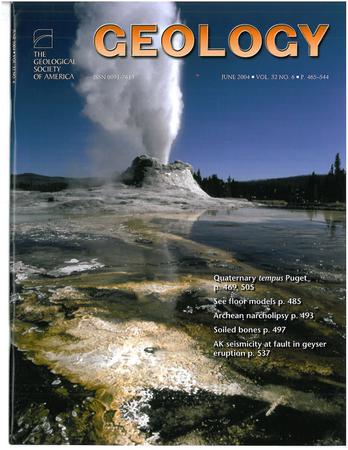三维电阻率结构揭示了1988年澜沧江-耿马地震偶波的级联破裂过程
IF 4.6
1区 地球科学
Q1 GEOLOGY
引用次数: 0
摘要
双重地震——发生在紧密连续的两次大地震——对理解断层相互作用和破裂动力学提出了挑战。本文利用三维大地电磁成像技术研究了1988年澜沧江-耿马地震双重波的地壳电阻率结构影响。电阻率模型显示了一个高电阻率异常(R1),解释为两个震中之间的刚性粗糙体,两侧是导电断裂带(C1和C2)。R1可能是应力聚集带,C1和C2可能是弱断裂段,有利于破裂扩展。这些电阻率域之间的相互作用控制了级联破裂序列。这些结果强调了地壳电非均质性对大板内地震动力学的影响,并为断层相互作用和应力传递提供了新的见解。本文章由计算机程序翻译,如有差异,请以英文原文为准。
Three-dimensional electrical resistivity structure reveals the cascade rupture process of the 1988 Lancang-Gengma earthquake doublet
Earthquake doublets—two large earthquakes occurring in close succession—pose challenges for understanding fault interaction and rupture dynamics. This study employs three-dimensional magnetotelluric imaging to investigate how crustal resistivity structure influences the 1988 Lancang-Gengma earthquake doublet in southwestern China. The resistivity model reveals a high-resistivity anomaly (R1), interpreted as a rigid asperity between the two epicenters, flanked by conductive fault zones (C1 and C2). R1 likely acted as a stress accumulation zone, while C1 and C2 serve as weakened fault segments that facilitate rupture propagation. The interaction between these contrasting resistivity domains controlled the cascading rupture sequence. These results underscore the influence of crustal electrical heterogeneity on large intraplate earthquake dynamics and offer new insights into fault interaction and stress transfer.
求助全文
通过发布文献求助,成功后即可免费获取论文全文。
去求助
来源期刊

Geology
地学-地质学
CiteScore
10.00
自引率
3.40%
发文量
228
审稿时长
6.2 months
期刊介绍:
Published since 1973, Geology features rapid publication of about 23 refereed short (four-page) papers each month. Articles cover all earth-science disciplines and include new investigations and provocative topics. Professional geologists and university-level students in the earth sciences use this widely read journal to keep up with scientific research trends. The online forum section facilitates author-reader dialog. Includes color and occasional large-format illustrations on oversized loose inserts.
 求助内容:
求助内容: 应助结果提醒方式:
应助结果提醒方式:


